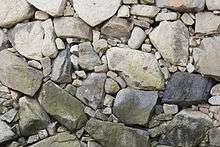Hikone Castle
| Hikone Castle 彦根城 | |
|---|---|
| Hikone, Shiga Prefecture, Japan | |
|
Hikone Castle Keep | |
| Type | Azuchi-Momoyama castle |
| Site information | |
| Controlled by |
Ii clan (1622–1874) Japan (1874–present) |
| Condition | Largely intact. Lord's Inner Palace rebuilt in 1987. |
| Site history | |
| Built | 1603–1622 |
| Built by | Ii Naokatsu |
| In use | 1622–1874 |
| Materials | Wood, stone, plaster, tile |
Hikone Castle (彦根城 Hikone-jō) is a Japanese Edo-period castle in the city of Hikone, in Shiga Prefecture. It is considered the most significant historical building in Shiga. Hikone is one of only 12 Japanese castles with the original keep, and one of only five castles listed as a national treasure.
History
Hikone Castle traces its origin to 1603 when Ii Naokatsu, son of the former daimyo Ii Naomasa, ordered its construction. The keep was originally built in 1575, as part of Ōtsu Castle, and was moved to Hikone by the Ii clan. Other parts of the castle were moved from Nagahama Castle.[1] Hikone Castle was completed in 1622. Naokatsu's lands had been taken from him in the interval by the Tokugawa shogunate, and when his brother Naotake assumed control of the area around Ōmi Province, he was able to complete the castle by collecting stones from the former Sawayama Castle.
When the Meiji era began in 1868, many castles were scheduled to be dismantled, and only a request from the emperor himself, touring the area, kept Hikone Castle intact. Today it remains one of the oldest original-construction castles in Japan. The main keep of Hikone Castle was designated a National Treasure by the Ministry of Education, Science, Sports and Culture in 1952.[2] Hikone Castle also has several parts which are designated Important National Cultural Assets:[3] Umaya (Stable), Tenbin Yagura (Balance Scale Turret), Taikomon Yagura (Drum Gate Turret) and Nishinomaru Sanju Yagura (West Bailey Three-story Turret).
Gallery
-

Foundation of the main keep
-

Tenbin Yagura and Rokabashi Bridge
-

Sawaguchi Tamon Yagura
-
Omotemon-gate and Palace in 1876
-

View from Genkyuen
See also
- List of Special Places of Scenic Beauty, Special Historic Sites and Special Natural Monuments
- List of National Treasures of Japan (castles)
- List of National Treasures of Japan (paintings)
- Hikonyan, mascot of Hikone Castle, based on the Maneki Neko folktale about Ii Naotaka.
References
External links
![]() Media related to Hikone Castle at Wikimedia Commons
Media related to Hikone Castle at Wikimedia Commons
Coordinates: 35°16′35″N 136°15′06″E / 35.27639°N 136.25167°E
